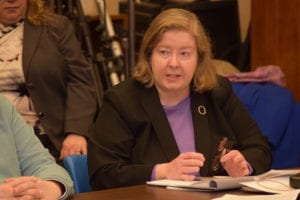Who is a member?
Our members are the local governments of Massachusetts and their elected and appointed leadership.

Milton Select Board Member Katie Conlon, president of the Massachusetts Select Board Association, speaks about the state budget and local finance challenges during the Feb. 11 Local Government Advisory Commission meeting at the State House.
The House and Senate budget committees have been meeting jointly since last month at hearings across the state to hear public comments as they start drafting the legislative version of a fiscal 2021 state spending plan.
The governor filed his recommendation on Jan. 22.
A hearing on municipal and school aid accounts is scheduled for March 6 in Malden. The series of eight hearings wraps up on March 23 in Boston.
The House and Senate Ways and Means committee chairs, Rep. Aaron Michlewitz and Sen. Michael Rodrigues, are also meeting with individual legislators to discuss funding priorities for next year, including local aid programs. This is the time of the year for municipal officials to talk to their legislators about local budget needs and priorities.
The House Ways and Means Committee’s budget recommendation is expected to be released in mid-April, with a final House budget approved by the end of the month. The Senate is expected to take up the budget in May.
The fiscal 2021 budget bill filed by Gov. Charlie Baker in January would fund the main municipal and school aid accounts consistent with recent legislative commitments, including the general revenue-sharing practice that has been in place since 2015 and the school funding schedules included in the Student Opportunity Act, enacted last November.
MMA testimony at the March 6 hearing will express support for a $31.6 million increase in the main discretionary municipal aid account, Unrestricted General Government Aid, which would grow at 2.8%, the same rate as the projected growth in state tax collections, and full funding of commitments made in the Student Opportunity Act.
The governor’s fiscal 2021 budget submission would bring Chapter 70 school aid up to $5.48 billion, an increase of $303.5 million (5.9%). This would fund the first year of the seven-year plan to add $1.5 billion in new state funding for K-12 education. This is important progress for many cities and towns, but about half of local and regional school districts would remain minimum-aid-only and receive just $30 per student in new aid. The MMA is seeking at least $100 per student in minimum aid in the Legislature’s budget.
The governor’s budget would increase the charter school reimbursement account to $138.2 million, intended to meet the commitment in the Student Opportunity Act to fund 75% of the state’s statutory obligation to mitigate Chapter 70 losses to charter schools. The new education law pledges to phase in full funding of the statutory reimbursement formula over three years, but it would not fix what the MMA contends are serious flaws in the charter school finance system.
The governor’s budget would add $17.4 million to fund the Special Education Circuit Breaker program at $362.5 million, an increase of 5%. The Student Opportunity Act expanded the Special Education Circuit Breaker by including out-of-district transportation, a change supported by cities and towns. This new transportation component is being implemented over four years, and the governor’s budget proposal includes the 25% phase-in amount for the coming year.
Most other aid accounts would be level-funded in the governor’s bill.